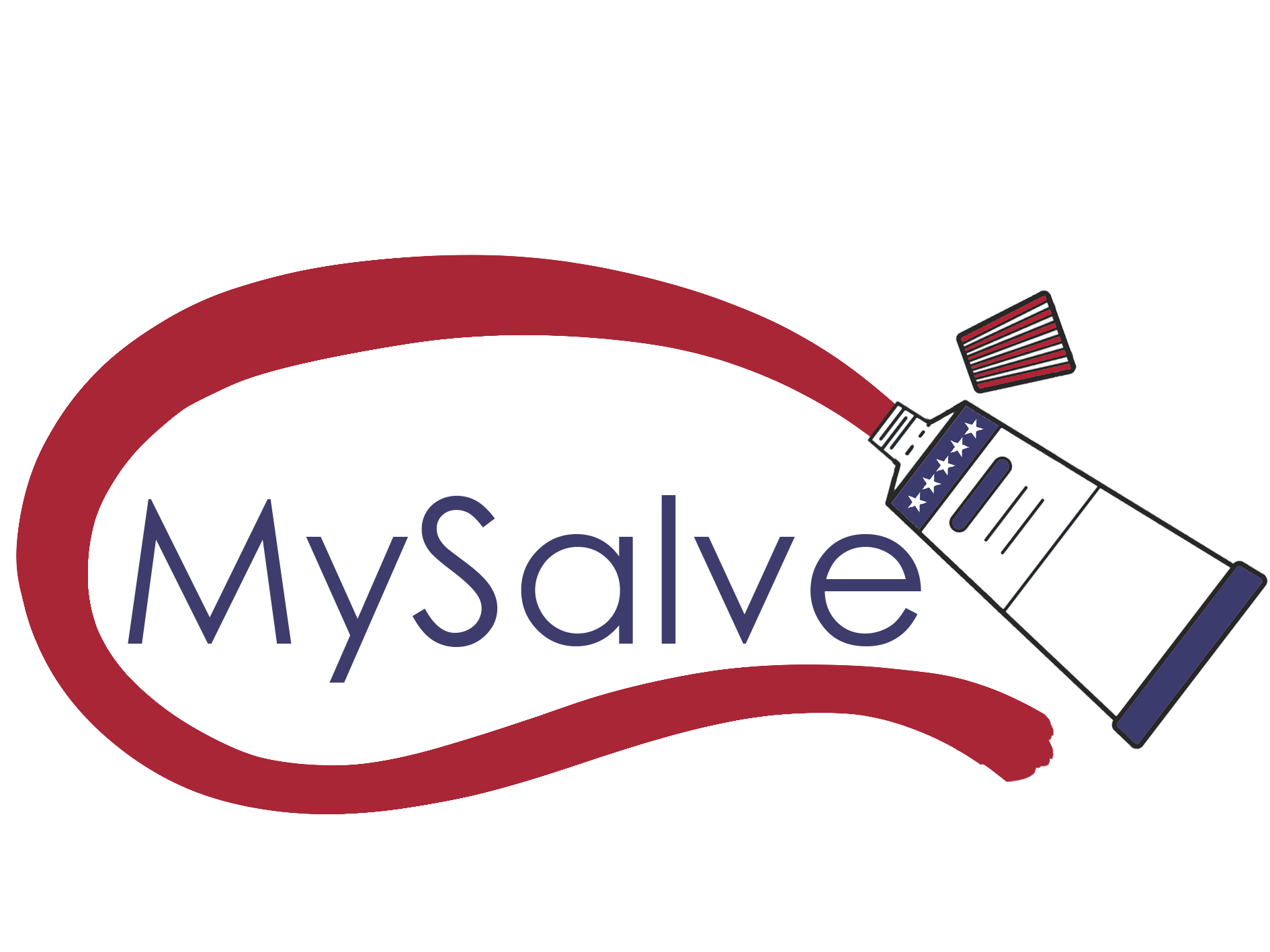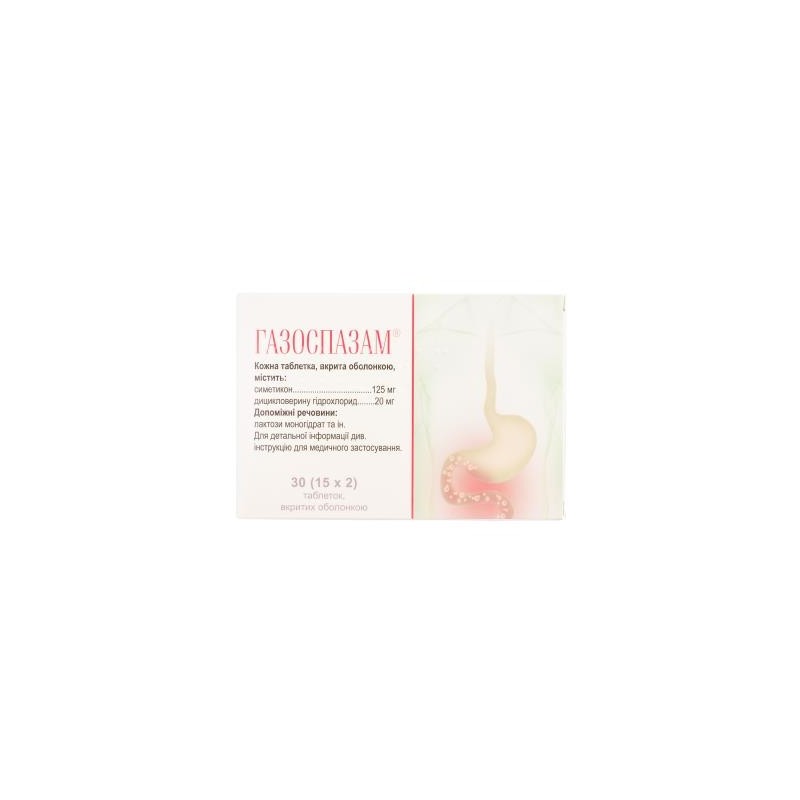Dicycloverin, Simethicone
 Secure and encrypted payment processing
Secure and encrypted payment processing We ship to over 40 countries including the USA, UK, Europe, Australia and Japan
We ship to over 40 countries including the USA, UK, Europe, Australia and Japan Guaranteed refund or reship if you haven't received your order
Guaranteed refund or reship if you haven't received your order
Pharmacological properties
gas spasm is a combination drug that combines two drugs: dicycloverin hydrochloride and Simethicone.
Dicycloverin hydrochloride has an antispasmodic (eliminates spasm of smooth muscles in the gastrointestinal tract, abdominal pain associated with spasm or extension of the gastrointestinal wall) and antisecretory effect on excretory glands. The effect of dicycloverin is achieved thanks to a specific anticholinergic (antimuscarinic) effect on acetylcholine receptors, as well as a direct antispasmodic effect on smooth muscles. Studies have shown that dicycloverin is equally effective for cramps induced by acetylcholine and barium chloride. The action of atropine in spasm caused by barium chloride is 200 times weaker than that in acetylcholine-induced spasm. The mydriatic effect of dicycloverin and its effect on the secretion of the salivary glands are negligible compared to the effects of atropine (1/500 and 1/300, respectively).
Simethicone is a surfactant, antifoam. The mechanism of action is based on reducing the surface tension of gas bubbles, which contributes to the free removal of gases from the gastrointestinal tract or their absorption by the intestinal wall. Simethicone improves the quality of radiographs and sonograms, provides a better distribution of contrast agents on the intestinal mucosa.
Pharmacokinetics Dicycloverine hydrochloride is rapidly absorbed in the digestive tract when taken orally, Cmax in blood plasma is reached after 60–90 minutes; excreted mainly in urine (79.5% of the administered dose), partially with feces (8.4%). T½ - 1.8 hours. The average volume of distribution is 3.65 l / kg.
Physiologically and chemically, Simethicone is an inert substance, it is not absorbed and excreted unchanged after passing through the digestive tract.
Indications
Treatment of conditions accompanied by spasm of the smooth muscles of the gastrointestinal tract and flatulence, as well as associated abdominal pain. treatment of spastic conditions of the gastrointestinal tract, including colitis, intestinal colic, irritable bowel syndrome, spastic constipation. as an additional treatment for organic diseases of the gastrointestinal tract in colitis, diverticulitis, enteritis, gastritis, ulcers.
Application
Doses for adults and children over the age of 12 years: 1 tablet 4 times a day (5-10 ml of a suspension 3-4 times a day); the maximum daily dose is 4 tablets (40 ml of suspension). shake well before using the suspension.
The drug is recommended to be taken before or after a meal. It is not recommended to take the drug for more than 5 days.
Contraindications
Hypersensitivity to the components of the drug. obstructive diseases of the gastrointestinal tract, paralytic intestinal obstruction, stenosis of the pyloric department of the gastrointestinal tract with obstruction, severe ulcerative colitis, reflux esophagitis. obstructive biliary tract disease. renal failure, obstructive diseases of the urinary tract, prostate adenoma with difficulty urinating. glaucoma. myasthenia gravis. thyrotoxicosis. heart failure, an unstable state of the cardiovascular system in acute bleeding.
Side effects
The following side effects relate to the group of anticholinergic drugs, but not all of them are noted with dicycloverin hydrochloride:
From the digestive tract: dry mouth, loss of taste, anorexia, nausea, vomiting, indigestion, bloating, abdominal pain, constipation.
From the side of the central nervous system: tinnitus, headache, drowsiness, weakness, nervousness, psychosis, numbness, dizziness, coma, confusion and / or agitation (especially in elderly patients), dyskinesia, insomnia, disorientation, short-term memory loss, hallucinations , dysarthria, ataxia, euphoria, inadequate emotional reactions (symptoms decrease 12-24 hours after a dose reduction).
From the side of the organ of vision: blurred vision, double vision, dilated pupils, accommodation paralysis, increased intraocular pressure (short-term atropine-like effects that disappear after dicycloverin is canceled).
Skin side / allergic reactions: hypersensitivity reactions, including allergic dermatitis, itching, rash, urticaria, erythema, drug idiosyncrasy, angioedema, anaphylactic shock.
From the genitourinary system: difficulty urinating, urinary retention.
From the cardiovascular system: tachycardia, sensation of increased heartbeat.
From the respiratory system: choking, apnea, nasal congestion.
Other effects: decreased sweating, nasal congestion, sneezing, swelling of the mucous membrane of the throat, inhibition of lactation.
special instructions
At a high ambient temperature during treatment, overheating of the body is possible (increase in body temperature and heat stroke due to a decrease in perspiration). when the corresponding symptoms appear, it is necessary to cancel the drug and consult a doctor.
Diarrhea can be an early symptom of incomplete intestinal obstruction, especially in patients with an ileostomy or colostomy. In such cases, drug treatment is inadequate, and possibly harmful.
In individuals with individual hypersensitivity to anticholinergics, the drug can cause effects from the central nervous system, such as blurred consciousness, disorientation, ataxia, increased fatigue, or vice versa - euphoria, agitation, insomnia, and affective state. Typically, these symptoms disappear within 12-24 hours after discontinuation of the drug.
Gas spasms should be used with caution in patients with autonomic neuropathy, liver or kidney disease, ulcerative colitis (taking high doses can cause paralytic bowel obstruction and the development or exacerbation of such a serious complication as toxic megacolon), hypertension, coronary heart disease, congestive heart failure, tachyarrhythmia, tachycardia, hiatal hernia and prostatic hypertrophy.
Excipients. The tablet formulation contains lactose. If you are intolerant of certain sugars, you should consult your doctor before taking this medication.
Use during pregnancy and lactation. The safety of treatment with dicycloverin and Simethicone during pregnancy has not been established, therefore, the drug should not be used in pregnant women.
Since dicycloverin hydrochloride passes into breast milk, the drug should not be used during lactation.
Children. Do not use in children under 12 years of age.
The ability to influence the reaction rate when driving vehicles or working with other mechanisms. Dicycloverin hydrochloride can cause drowsiness and blurred vision, therefore it is not recommended to drive vehicles and mechanisms that require an increased concentration of attention and a high speed of psychomotor reactions while taking the drug.
Interactions
Amantadine, class I antiarrhythmic drugs (e.g. quinidine), antihistamines, antipsychotic drugs (e.g. phenothiazines), benzodiazepines, MAO inhibitors, narcotic analgesics (e.g. meperidine), nitrates and nitrites, sympathomimetics, tricyclic antidepressants and other drugs with anticholinergic activity or side effects of dicycloverin.
Anticholinergic drugs can neutralize the effect of antiglaucoma drugs, therefore, the drug should be used with caution with increased intraocular pressure and the simultaneous use of corticosteroids.
Anticholinergics can alter the absorption in the gastrointestinal tract of certain drugs, in particular, long-acting digoxin, which can cause an increase in the concentration of digoxin in the blood plasma.
Dicycloverin can neutralize the effect of drugs that alter the motility of the gastrointestinal tract, such as metoclopramide.
Since antacids can reduce the absorption of anticholinergics, their simultaneous use should be avoided.
The inhibitory effect of anticholinergics on the secretion of hydrochloric acid in the stomach can neutralize the drugs used to treat achlorhydria and study gastric secretion.
Overdose
Symptoms: headache, nausea, vomiting, dry mouth, difficulty swallowing, blurred vision, dilated pupils, hot and dry skin, dizziness, tachycardia, change in respiratory rate, psychomotor agitation. curare-like action may occur (neuromuscular blockade, a feeling of muscle weakness and paralysis).
The treatment is symptomatic, in the first hours it is indicated to induce vomiting, to conduct gastric lavage.
Storage conditions
In the original packaging at a temperature not exceeding 25 ° C.

